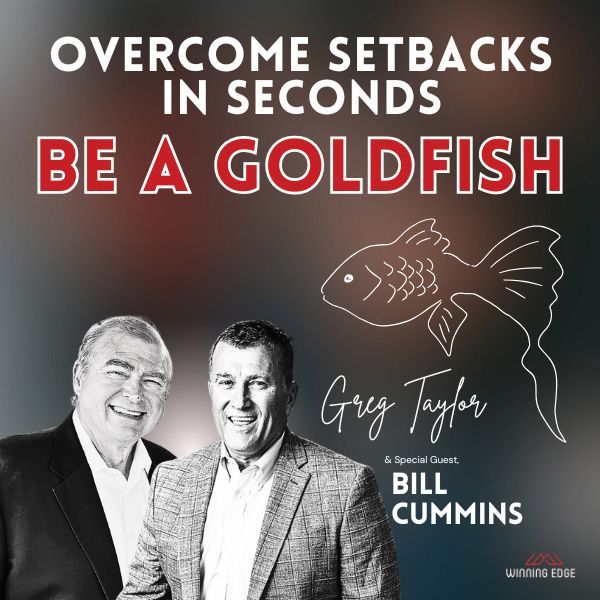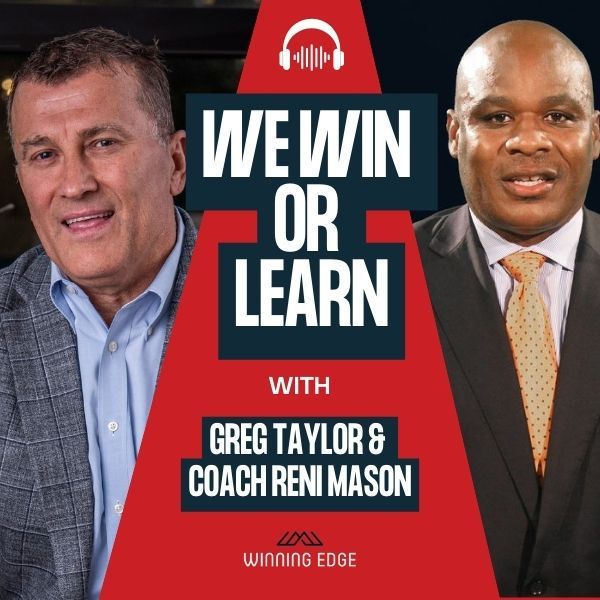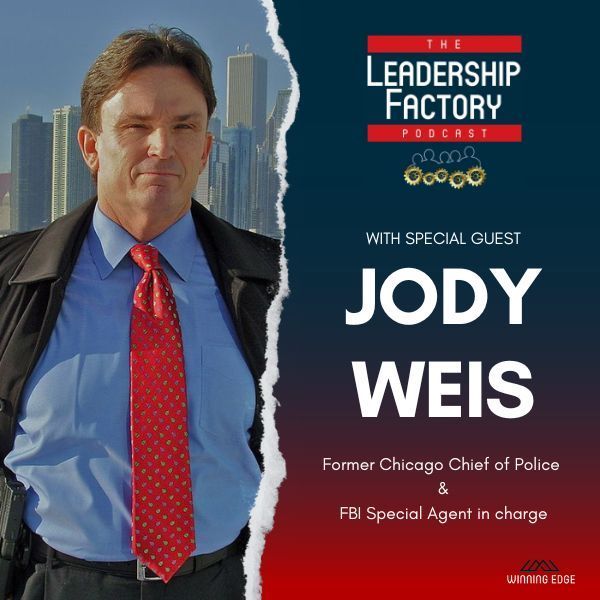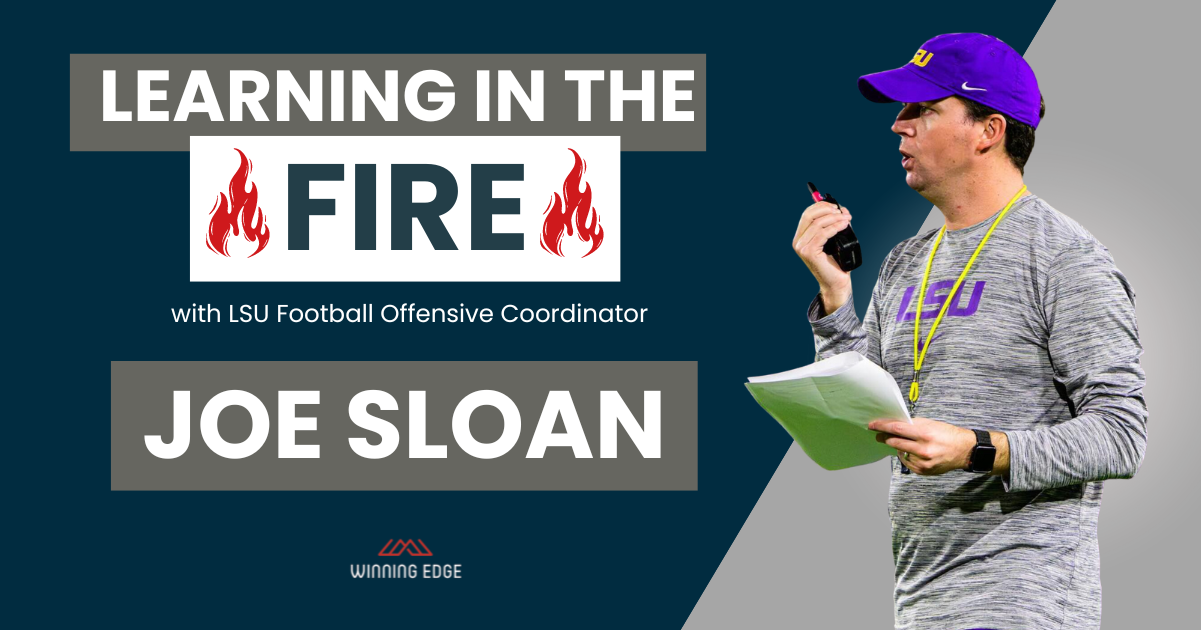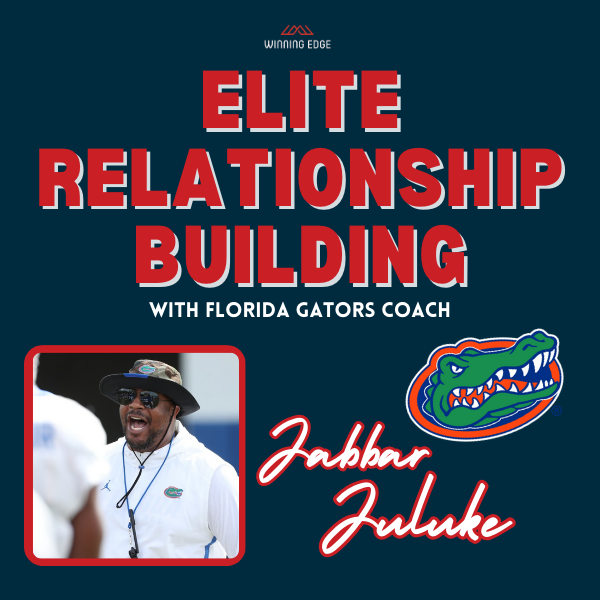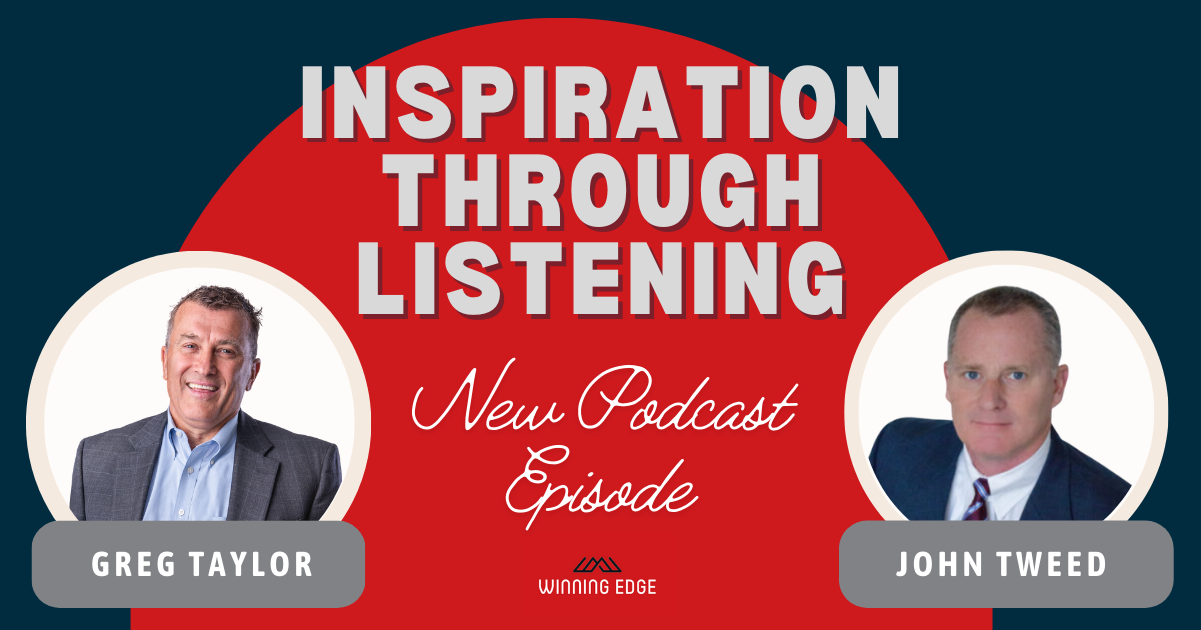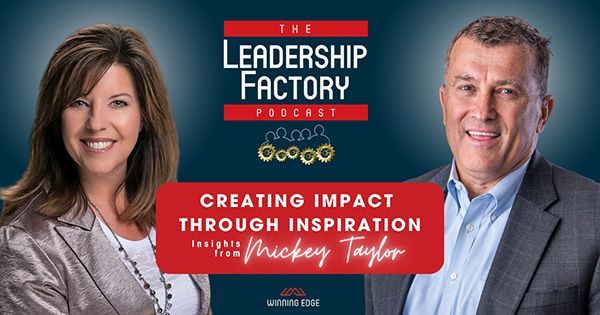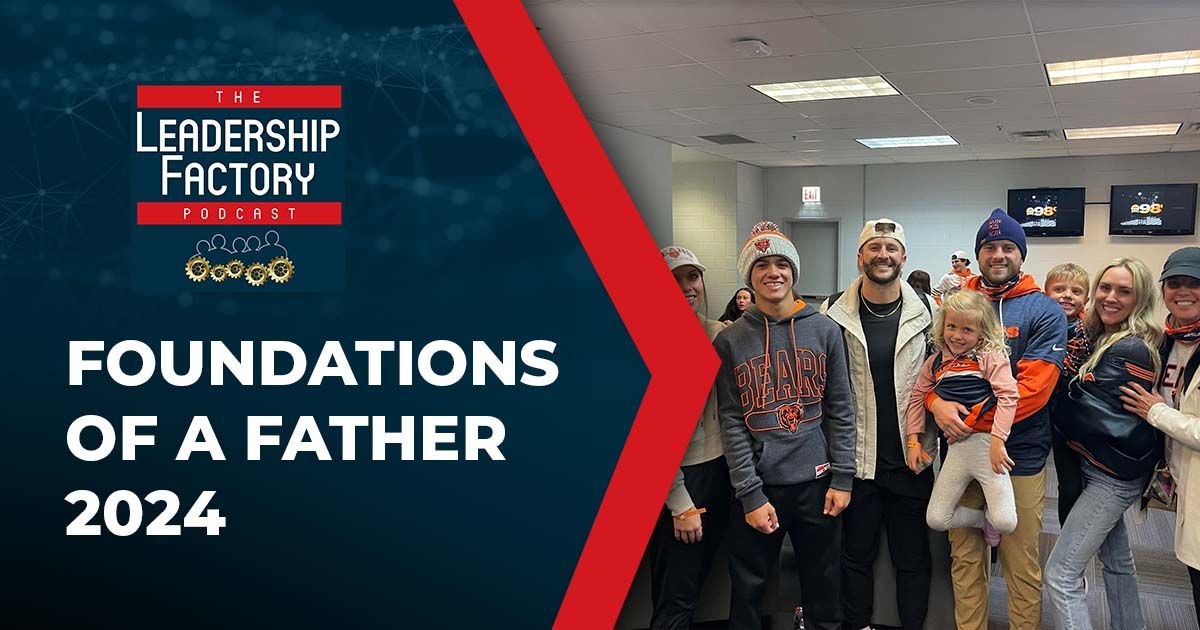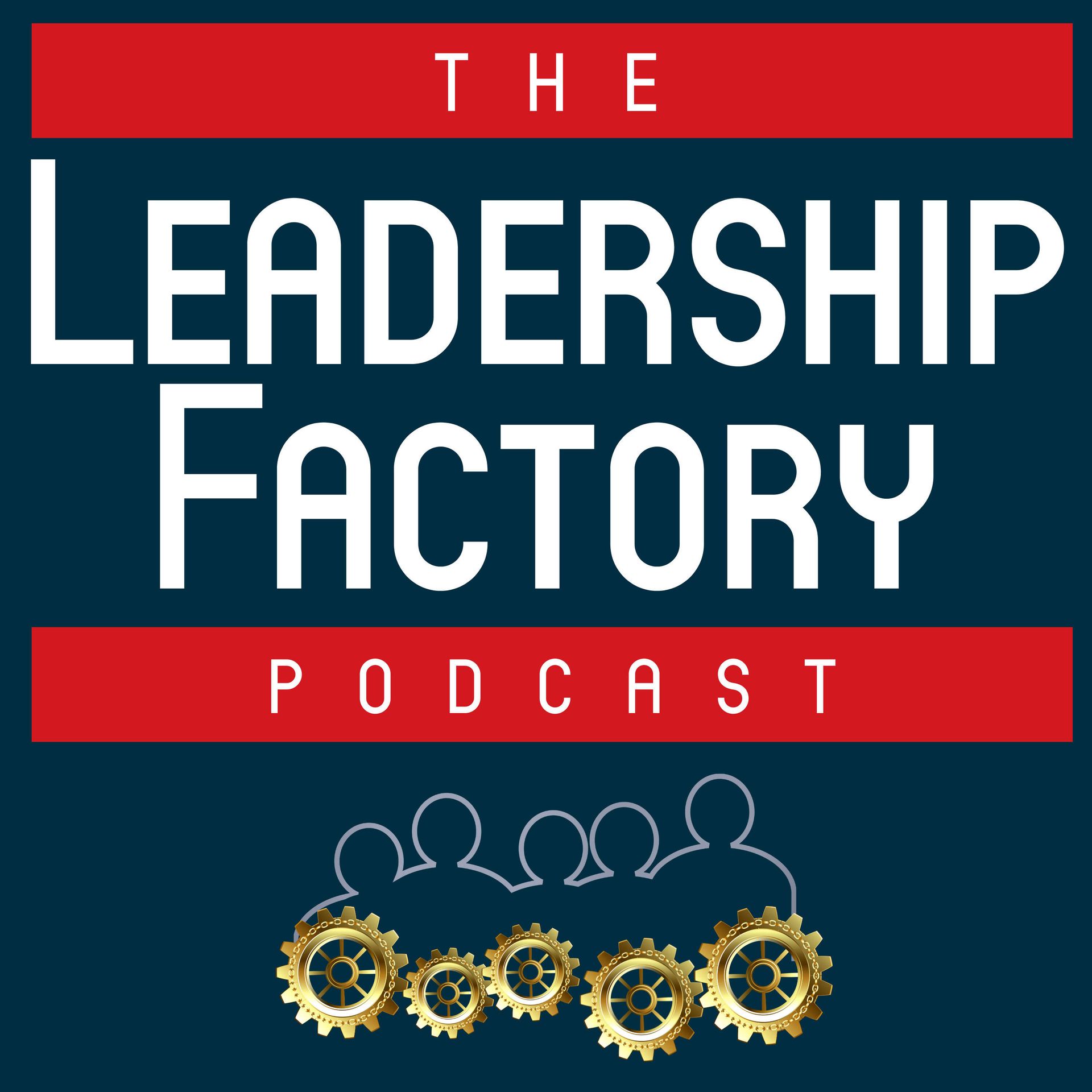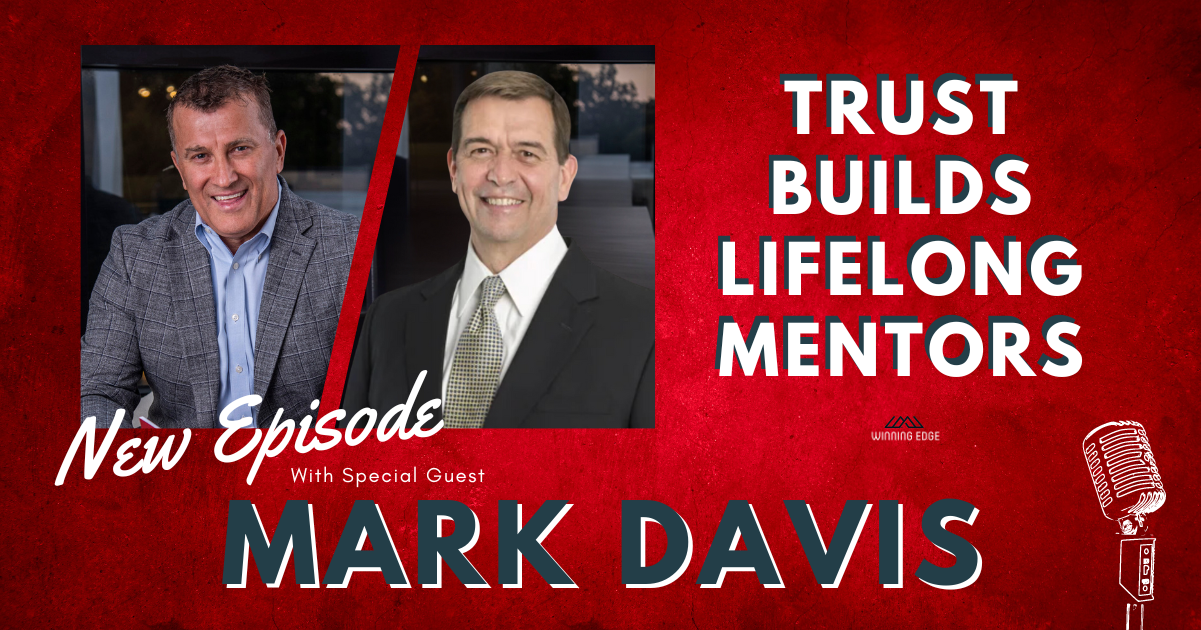
In this episode of The Leadership Factory Podcast, Greg Taylor sits down with Mark Davis, VP of Pricing and Traffic at Averitt Express, to discuss the power of leadership rooted in trust, accountability, and inspiration. Mark shares stories from his 46-year career, including how he draws out the best in people by building relationships and leading with empathy. Together, Greg and Mark explore how great leaders lift others up, help their teams grow, and create positive, lasting impacts. Tune in for valuable insights on how to inspire change and foster growth in your own leadership journey.
---
Listen to the podcast here
Trust Builds Lifelong Mentors With Mark Davis
In this episode, Greg Taylor sits down with Mark Davis, VP of Pricing and Traffic at Averitt Express to discuss the power of leadership rooted in trust, accountability, and inspiration. Mark shares stories from his 46-year career, including how he draws out the best in people by building relationships and leading with empathy. Together, Greg and Mark explore how great leaders lift others up, help their teams grow, and create positive lasting impacts. Tune in for valuable insights on how to inspire change and foster growth in your own leadership journey.
---
Introduction And Mentorship Impact
Everybody, welcome Mark Davis to the show. Mr. Davis, how are you doing?
I’m doing great.
What side are you about?
I’m on the right side of the grass.
That’s good. People are looking for a great conversation with me. I didn’t know when I was going to open the can of worms up. You
were the first leader in my business career. I laid a bag right there. I was going to save it till the end, but I laid out the bag right there.
That works for me.
You took a young man at 23 years old that no deadly squad in business. For the next eight years, you pumped life into m
Let me back up a little bit because you were one in a class of half a dozen.
About six leadership trainees.
It’s almost like looking at litter pups or maybe some cattle. We were looking around and I said, “I want that one right there.” I see energy in him and I know a little bit about his background other than he plays ball at Western Kentucky. I said, “I’ll take him.” That’s how we got started.
I’m glad you took me. My wife and I loved our eight years there with you in Averitt Express and the whole city. Averitt is an amazing company. I was blessed to be under you and to be at that company because you all were an extension of my family. What my mom and dad were teaching me at 23, you all kept teaching me to me until I was 31. It got into my rock head because God knew I needed to live in more development and training to take place.
You had the raw material. You’re made of the right stuff. All it took was a little polishing.
I got a bonus question at the end. I’m not going to divulge that for you. The show’s goal is to help people inspire other people. With over 37 years and you being a part of those first 8 years of my journey, I’ve come to a profound conclusion that a leader is a person who can inspire another person to take a journey that they’re not going to take by himself. We’re going to have a discussion about that and our audience is going to learn and grow from this so they can be the very best version of an inspirational leader.
As we always say here, if it’s not on paper, it’s vapor. My challenge is for you to get three nuggets out of this. I want you to figure out what’s the most powerful thing that you got out of this episode with Mr. Davis because he’s going to drop a bunch of nuggets on us. Get your pad and pen ready to go because, in the end, I’m going to challenge you. Did you get your three points and what’s that one thing we call the domino effect? When you hit that first domino, it knocks all the other dominos down. Are you ready to rumble in the jungle Mr. Davis?
Let’s do it.
The first question is out of the gate here. Who is your best leader and why? Who inspired you to do something you probably wouldn’t have done by yourself? What do you know about them? What do they see you do? How do they make you feel?
The Leadership Principle Of Accountability
This might be a little different, but I’m going to say it was my mother who was the biggest leader ever in my life. First of all, she was probably the most kind and loving person I’ve ever known. She was a nurse. She had that heart of a servant-leader mindset. Early on, I knew how much respect other people had for her. Only because she was sweet. She was sure no pushover. She was tough as nails. Not in a harsh way, but she was so disciplined and was all about accountability.
She would not tolerate any victim mentality. Not in our house. That didn’t play. She set a great example for all six of her kids on how to live. Although she had her first of four heart attacks at age 56, she didn’t slow down one bit. She was a nurse and she worked for a big manufacturer in Lawrenceburg, probably up to 2,000 employees at some point. She was head of their medical services. She was a friend, confidant, therapist, and nurse. She played all the roles for so many people. I knew how much she was respected, but when she passed, I had never seen so many people in my life who showed up to honor her. I got through her life real quick, and she did. I left out a lot.
What’s the one thing that she put into you that you used unconsciously every day? Something that’s a part of who you are.
I think accountability. She was a stickler on that. I don’t care if it was making your bed or whatever chores that we did around the house or homework or school work. I don’t say she demanded it. She expected it and some of us complied. I did.
That’s powerful. She expected it. This is not something we’re going to make up and do because this is who we are.
That’s how she was raised. Her parents, my grandmother and my grandfather, were the same way.
Growth Of Averitt Express
That gave you the ability. When you started Averitt Express, how big were they?
I was the 35th person they hired. I think we did $1.6 million for the year in 1978. As I said, if we don’t do that by 9:00, we’re going to have a bad day.
I don’t know if you can divulge this information or not. What do you close to now a year?
We’ll do about $1.8 billion.
Over $1.5 billion now. When you started, you did $1.6 million. That’s crazy.
Yes. I could work one shift to make 48 hours on a minimum-wage job. I would be in college.
Which was what, $3 an hour?
Two and a quarter.
Some of our younger audience are going, “What the hades?”
I interviewed for the job and the internal manager said, “Mark, I tell you what we want. We want something to come in here, do their job, and keep your mouth shut.” I said, “I’m your guy.” I went to work and tried to give everything I had. One of these guys stopped me one day and said, “Slow down.” At first, I went, “What? What do you mean slow down?” He said, “Slow down. You’re working too hard.” I said, “I get it. That’s why I don’t have much for unions.” That was part of that whole I don’t understand what you’re saying because they’re paying me more money than I’ve ever had. That was one of the realizations that everybody doesn’t this. It’s not everybody’s mindset.
Positioning People For Success
How do you address people in your 46-year career at Averitt Express? When you come in contact with people, they don’t get it because it goes into their lives. They never had anybody model that for them.
I know at Averitt Express, we always talk a lot about leading by example. How do you help people understand that when they have never been modeled that, the 25 or 35 or however old they are?
We try to explain what the expectations are. If you know what’s expected of you, then the next step is, are you going to do it? If that doesn’t happen, we have a whole other matter to deal with. Sometimes, people are in the wrong position. Good coaches put people in the right spot. Hopefully, they can be better players. We’ve had many success stories where it wasn’t that they could or wouldn’t. It’s that they weren’t in the right spot. When they got in the right spot, they flourished. Those are success stories that you want and celebrate, “This person is a good person or good associate, productive, and a team player.”

Can I ask you a question and put your consultant hat on? If somebody tuning in to this and they have a person. It’s a good person. They show up on time, but they can’t get done what they need to get done. I know somewhere because I’ve dealt with this many times in my 37-year career. I know you dealt with it but there’s something good about it.
Strategic Decision-Making And Long-Term Thinking
Here’s what I would say about it. First of all, when you approach someone about their deficiency in their performance, they’re going to be defensive or scared. They’re fearful of their job. When you say, “Is there something you don’t get here?” You got to draw it out of them. You got to get their trust and say, “I’m not here to beat you up. I’m here to help you.” If there’s something that you don’t understand or you can’t get, let me know about it.
Sometimes, that works. Other times, maybe it was the motivation. You get this done. If they truly don’t understand it and we know they have the other attributes we wanted as an associate, they are hard-working, they are team players, they get along, and they want to be part of the team. Try to find them. As you know, we have all kinds of roles here.
It takes all of my body parts to get me up and walk every day and to function at the highest level that I can personally function. It takes my pinky, my toe, and my elbow. It takes everything. If all those things don’t work together and understand the value that each one of them has, you can’t function as a team. That’s probably the biggest thing that you all taught me and that my parents taught me that had solidified. I’ll tell you everything I learned, but it solidified what my mom was trying to teach me that I didn’t pay attention to.
You didn’t know what they were talking about until you got here.
I was like, “These people keep saying the same thing.” I tell people that you all were the validation of my raising for eight years. I’m a validation guy. I need to validate. People need to validate. That’s what inspires me. You said a word there and that has a good second title drawing out of it. The word inspire has all kinds of definitions. One of them is to draw out of someone. It’s in them. You got to draw it out. That’s what inspiration is. It’s how do you draw that out of that person?
I agree.
That was good. Do you have any other inspirational leaders that you want to talk about?
I got a couple more. I got three more that maybe we could talked a little bit.
You’re my boss. I can’t tell you what to do. You can do whatever the heck you want to do.
I was.
You still are.
Balancing Family And Business
My brother-in-law, John. We spoke a little bit about him earlier. I have one young brother and four sisters. Three of which were older than I am. I never experienced that big brother until he married one of my sisters. John is two years older than I am. We went to the same grammar school. We played in the same sports league. We played the same baseball stuff in high school and football. He was two years older than I was but he and my sister got married in his senior year.
We’d walk home from practice and he was maybe a little hero worship. A lot of hero worship because he was a tremendous athlete. He was a good pitcher and a home run hitter at the same time. I was a mediocre at best. In football, he was our full back, middle linebacker, and captain. He was looked up to. He was solid as could be and the smartest guy I’ve ever met. He didn’t go to school but he had a great career in an automotive plant and retired not too awful long ago.
He is a quiet leader. He doesn’t have to be tough or yell. He is a guy that led by example. When he did speak, people listened because he had a proven quality and he was humble. In today’s athletics, you don’t see a lot of humility. That always inspired me that you don’t have to be somebody who rants, raves, and whatever.

Some say you’re like Brock Purdy then.
I don’t know much about him. He seems pretty mild-mannered.
Trent says he’s everything everybody’s perception is. Brock Purdy is this 49ers quarterback, which I don’t know if you may know. My son is on the 49ers roster this year. Trent says he’s a solid dude.
He was a breakout guy last year. I hope he gets paychecks, a real one.
He’s going to get paid. His paycheck for a year is what Aaron Rodgers got paid for one game. I saw some pictures. I can’t remember what, but that’s relative to what he gets paid versus what these other quarterbacks do.
He needs to remain healthy. That’s what he needs.
You have to keep growing. You have to keep playing. I use the tagline “Let’s row.” I don’t know if we ever talked about that every day when I worked at Averitt Express, we’re getting better. I’m going to tell a story. You can’t tell a story here.
Is it what I don’t remember?
I told you this before you went, “I don’t remember that.” This is my story.
Go for it.
I got my goals. I had my goals. I’m looking at him and I’m going on, “I don’t know about all that.” You and I are having a conversation about it. It’s like everybody else, “This and that. I need this. I can’t do this.” You finally put your hand over and said, “Stop. I’m done.” You would always give me time to talk but there was a time limit that you would give me whatever the circumstances were. I didn’t know this at that point in time.
Reflecting on all those years back, you would give me time to talk because I needed to talk. If I didn’t get to talk, I probably blow a fuse. You allowed me to express all the idiocy that’s in my brain. At some point, you said, “Let me explain this to you.” You said, “If you don’t get these goals ready, we’re going to be upset. If you don’t get better, we’re going to fire you.”
I don’t remember that.
This is my story. I said, “I understand that.” You said, “I didn’t know if he was going to understand it or not.” When you’re dealing with a hard-headed person, you have to figure out a way to get through them. “I can do that. I’m getting better.” You even said, “I know you can get better. It’s going to get better. Quit worrying about all of this stuff going on. Do you hear me? This could be somebody’s domino effect for you.”
Stop worrying about where they want you to go. Ask yourself every day, “Am I getting better? Am I better today than I was yesterday?” That’s what being your best means. Get better every day. If you can get better, somebody in this economy is going to find you. If you have a growth mindset that you’re committed to getting better and you get better every day, you’re going to get paid by somebody. Somebody is going to find you.
Who is your worst leader and why? No names. Who’s someone who drained you of your energy? It could be a coach, a parent, an uncle, an aunt, a cousin, or a friend. What do you know about them? How did they make you feel? What did you see them do to be an inspiring person?
I wouldn’t call them leaders, but if you surround yourself with people who lift you up, that’s always positive energy. Conversely, if you’re around someone full of dread, complaints, and misery, or they’re a victim, it has a way of grinding on you. If you’re not strong enough, the weak can fall right into that same trap. I have worked with a couple of folks like that. I tried my best to say, “That mindset will take you nowhere. If you don’t like it around here, then I highly recommend you to go somewhere where you can be happy because you’re not doing yourself any favors here.”
You want to surround yourself with people who lift you up.
Also, I’ve seen the same person drag some others down. I’ve been fortunate. I’ve had some leaders that weren’t necessarily inspiring but they didn’t produce anything negative to me. I’m thankful for those leaders. Maybe they gave me more autonomy. Sometimes I think that was a vote of confidence in me that I had either the know-how or the will to do something that necessarily didn’t need to be led.
Somebody gave you that autonomy because I had a guest previously. He’s from the trucking world. He said, “The most powerful thing someone did for me is give me a task and activity that I didn’t think I could do. They believed in me so much. They could see something in me that I couldn’t see in myself.” You did that for me.
The autonomy came because maybe of what I was doing. My role in our industry, relatively speaking, is fairly new. The role that I’m in and the role that you were in didn’t exist before 1980. It didn’t exist before 1985, probably. When you look at an industry that’s 100 years old, it’s still new.
Isn’t that crazy? It’s 100 years old. Japan became a country in 800 BC. Think about that. That’s 3,000 years ago. Trucking has only been in for 100 years. That boggles my mind.
Our country is what, 250 years old?
We’re babies. It’s crazy.
We’re about to ruin it.
We have strong people like Mark Davis. We have a lot of Mark Davis out there. We’ll be fine, coach. We’ll find a way. We have to find a way. We have to get a first down. You have to find a way to take another step. Who’s your unsung hero? Who did some amazing things that you’ve witnessed and they wanted nothing in return? They didn’t expect anything in return.
It may sound strange but this takes me back to my dad. My dad was a rural mail carrier. He worked six days a week and raised all six of us. He was a role player. He did his job, took care of his family, and provided for them. He was a baseball coach, Little League president, and photographer. He was a guy that wasn’t flashy. He would do things that not only supported us but all the kids in the community. He won the labor of love. We were all big University of Tennessee football fans and we had season tickets.
We would go every home game weekend from Lawrenceburg, Tennessee to Knoxville and back. Here’s a guy who already drove over 100 miles every day delivering mail. All his Saturdays that he wasn’t working, he took off and would drive 500 miles to Knoxville and back so that we had the opportunity to watch our beloved Vols. He’s an unsung hero.
That’s natural. It’s natural to some people, I put it that way. I was quite a bit like that early on myself until I learned that wasn’t a sign of weakness. It is a sign of smarts. When you need help, ask for it instead of failing.
Building Trust In Relationships
It takes trust. When people say, “They didn’t come and ask for it.” I would always tell them, “Maybe they don’t trust you.” They go, “What do you mean by that?” I said, “Do you know the wife’s name and kids name?” They go, “No.” I said, “It’s Angela, Michael, Susie, and Mike,” whatever their names are. He said, “How do you know that?” I said, “It’s because I interviewed them. I build a relationship with them.” He said, ”I interviewed them too. I didn’t get that information.” If you want to inspire someone, you have to know who they are. People can sense them. They know if someone cares about them.
If you want to inspire someone, you need to know who they are.
That’s the right word you said there. I was thinking of care. Do you care? You can’t fake it.
You know my wife and my two little boys at that point.
I sure got to know Trey.
We can’t go into that story as a child. He wore diapers but you can guess the rest of it. I tell people you’re still my mentor and I haven’t worked for you for 29 years.
Every time I hear you say that, that is so humbling to me.
I’m telling people. I was thinking about what to talk about. I don’t have any notes, so I’m flowing because I would start flowing at some point. I didn’t know when it was because I was trying to figure out how to help people and how can our relationship inspire everybody to have that relationship with someone for 37 years. My mom and dad taught me that I have to honor people. The Averitt and you taught me that. It’s easy to honor someone when they believe in you, trust you, and take care of you.
Honor is a tricky word. I don’t think that’s a subordinate versus superior. It cuts both ways. Maybe instead of honor is more respect. I don’t think that you can truly respect someone who doesn’t respect you. That’s so transparent. If you can’t see the fake part of that, then you’re blind. It goes back to that old rule that doesn’t go out of style, the golden one.
It's hard to respect anyone who doesn't respect you. Treat others as you want to be treated.
Go ahead and tell them what it is. In case somebody doesn’t know what it is.
Treat others as you want to be treated.
When you get stuck, what do you do to take another step? You’re stuck in doubt, fear, anxiety, or anger.
I try to break it down. I tried to do it in parts and what is it that is truly the concern? Is it a problem? There are parts to it. I don’t say cycle analyzed but I try to analyze and see what’s the stumbling block, what’s keeping me from doing what I need to do and want to do.
What’s the biggest “I’m so glad I took this risk” in your life? I’m so glad I did what in my life?
That I didn’t leave Averitt. There were a couple of times that I considered it.
You’ve been there for 46 years. That’s unheard of. At Averitt Express, that’s the norm.
Maintaining Company Culture And Relationships
It is funny. We’ll be in a conference room and we’ll have customers in. We start making introductions and someone will say, “Little Larry over there, he’s the junior man. He’s only been here for 26 years.”
Here’s a question. What is the special sauce at Averitt Express? I have my own personal opinion. Why do people come there and stay? Somebody is probably thinking there, “Greg, why did you leave?” My quick story is I had two little boys. I wanted to take them back home to where my Mom and Papa were. I want them back to my hometown.
The overarching all-encompassing special sauce is our culture. That is what we protect more than anything. What gives people angst about the future is whether we can maintain our culture. We’ve had a generational turnover in the top leadership but there is no concern because those people we backfill with have been part of what built the culture. We keep instilling these same values with all the young people that come on.
It’s not for everybody. That’s what I’d tell people sometimes. It doesn’t make us or you good or bad if our culture is not a fit for you. It is what it is. That’s what has kept me here. It’s the people and the relationships I’ve had. I was 22 and I’ll say Phil. We were young. We were having kids and our kids were friends. Now, our kids are having kids. Our kids are still close friends. It’s corny as heck but it’s family. I’ll be a mess when I leave here for a while anyway. I wake up on the first morning and go, “Holy moly. Where did everybody go?”
God has another plan for you. I know you got the book Halftime. Have you read that book?
I do have it but I have not read it.
We’ll move on then, Coach. As I said, you’re still the boss. I can’t tell you what to do.
I tell you what. I may have to rename that book. It said Halftime. I might rename it Two-Minute Warning.

The last two questions are a little different than the way I’ve done it. These are the surprise questions. Me being a strong-willed kid, with a high volume, loud voice but very introverted in a way. How did you get me to grow into the business? Here’s the question. When you took me or when you said, “I want that one right there,” what did you see as my weaknesses? I want to talk about my weaknesses.
Your personal weakness was your volume. I remember this now. I remember when we said to you, “Come here. We have to get that volume down a little bit because you’re scaring people.” That wasn’t your weakness at all.
Somebody has that person and that person is driving everybody crazy. You didn’t let it go because you’re a man of accountability. That’s what your mom taught you. You pulled me in and said, “We need to tone this down a little bit,” because there’s a relationship established. Correction without a relationship, people rebel. You had a relationship established, so it’s an inspiration.
I won’t name names but there are two very strong-willed women. They’re still here.
They’re amazing.
You worked with them.
Are you saying you were struggling with me? You can’t say that to me.
I was struggling with the situation because of those other two.
They were amazing.
They are. Like you and me, they have grown.
They both taught me a lot about who I was.
I don’t dwell on weakness unless there is a weakness. You didn’t have any weaknesses. You had a tendency that needed to be curbed a little bit. You had the energy and the passion. You brought all the right tools. You had everything that our company wants to be and that’s winners in all we do.
That’s probably the biggest connection point for me in Averitt. We both wanted to win and I’m willing to die to win. That’s obsessive. I know that sounds stupid but I played college football. They told me not to play because I could be paralyzed.
I think you told me after you were through that one of your coaches, I can’t remember who it was or if it’s a position coach or the head coach, said, “Son, you had no business here.”
I tried. I didn’t know that. My mom said I could do whatever I wanted to do if I was going to work for it. I’m going to work for it. I’m not scared of work.
That’s right.
Finding The Winning Edge
Last question. How did you connect to me to help me find my winning edge? You taught me about connecting with people. I was an introvert. You taught me how to network and introduce myself to people. How did you connect to me and what did you do to do that? Somebody might have a very highly energetic person and they’re trying to figure out what to do with them because most people are not going to deal with it.
I didn’t see the introverted side in you. I saw all that high energy as anything but introverted. I do realize that now. That’s a reality. That happens. One, I admired your tenacity. You made me want to work. I have a son-in-law who makes me want to be a better man. You affected me. You might not have known it. Maybe we had this energy that worked together and it was maybe a happy accident.
I have a praying mother. Be careful. I didn’t know this when I came across the line. You had a little vein on the side of your neck. You give me something. I can’t say what green you gave me. I knew right there. I came across the line and Pauline Taylor showed up. She said, “You better back away because I’m about to take you out.” That’s when I would sit down and go, “I’m done. Tell me what I’m supposed to do. I’m going to go do it.”
A lot of people say I have to be motivated. I was telling a client, “You have to be disciplined. Motivation is something that comes and goes. This one is something that sticks with you and you know that you have to do that. Even when you don’t feel like you have to do it, you do it anyway because that’s called discipline. That’s called freedom.”
My mom taught me that by busting my tail and loving me through that process and saying, “Greg, you’re making these choices. If you want a different result, you have to make a different choice.” You’re choosing to do this. Make a different choice. That’s discipline. I have to do this even though I don’t want to do it. I have to do it anyway. To me, when you tap into that, you become a free person. You have everything to gain. You have nothing to lose.
Truth.
I remember saying to you, Coach, I wouldn’t talk to anybody because one of those two ladies that we both know. After about six months, they looked at me and said, “We never thought you were going to talk.” I said, “Now you’ll wish I shut up.” I remember that’s probably six months. I didn’t talk to anybody. I was like, “I’m a rock head. I’m a dumb college football player. I’m wearing a suit every day. I don’t know what I’m doing here.”
My wife and this amazing person taught me grammar more than anybody. I didn’t want to learn grammar. How do I score a touchdown? It’s amazing because somebody is up that high-strung person. You have to slow him down a little bit. If you’re not willing to engage with them and get to know who they are and why they’re that way, it could be their personality or their life experiences telling them to be that way.
Let them know, “I’m here for you but you have to stop a couple of these things.” You have to let them develop through their process. As long as they’re getting better and taking another step, you’re getting on there because you can’t just go hire people. Take somebody that you trust. Take somebody who has talent and figure out what their talent is. My mom and you both told me, “Don’t let them frustrate you.”
I’d come in frustrated. I can hear you, “You’re letting them frustrate you.” You would say like my mom said, “They got you and they frustrate you.” Somebody needs to hear that. If somebody is frustrating you being a leader and you’re aggravated, they own you. You can’t let them frustrate you. You’re in charge. You used to tell me, “Greg, you’re in charge here. They’re not.” Make sure you keep HR happy. That’s one of my favorite lines I tell my clients, “Don’t make HR mad.” You would say, “If you make them mad, I can’t protect you. You’re on your own.” Do you have anything to close this up? It’s a good conversation.
It’s all good talk with you. I respect you more than you know. I love you like my second little brother.
Let’s do it, Coach. Great ride. Let’s keep rowing.
Let’s do it.
Anything I can do for you, you’re a beacon of light in the darkness. Averitt Express is an amazing place. All the people wearing the red shirts, I salute you for what you have done, what you’re doing, and what you’re going to do.
Don’t be a stranger. You know where we are.
We’re talking. I’m not being a stranger now.
We’ve been redoing this office since 1987.
That’s when I started.
Do you remember those purple panels?
Are they still there?
They’re leaving.
I may go there then.
Let’s get it done. We’ve started the process but it’ll probably be a few months.
There are three things I wanted you to write down. Write those three things down. What’s that powerful thing that can catapult your life, your family, your relationships, and your inspirational leadership journey to another level? Thank you, all. Mr. Davis, thank you so much. You’re all awesome. Thank you for everything you’ve done for me, Nikki, Trey, and Trent. Your brother Mark, we appreciate you, buddy.

